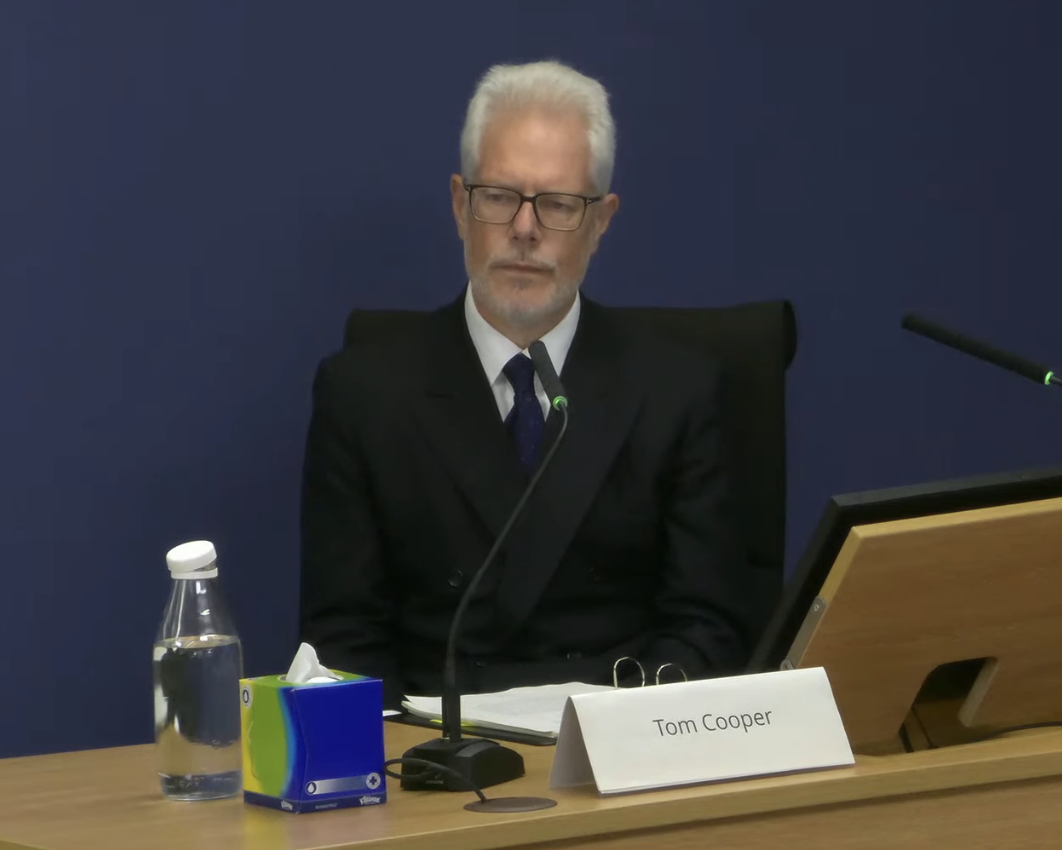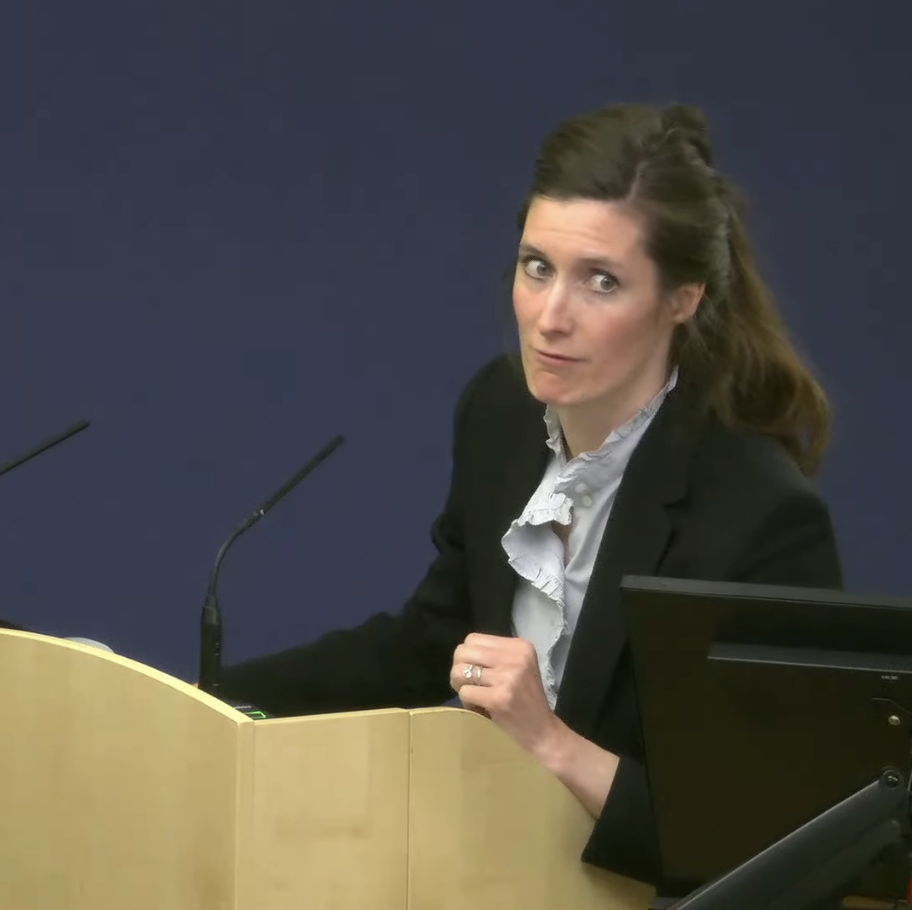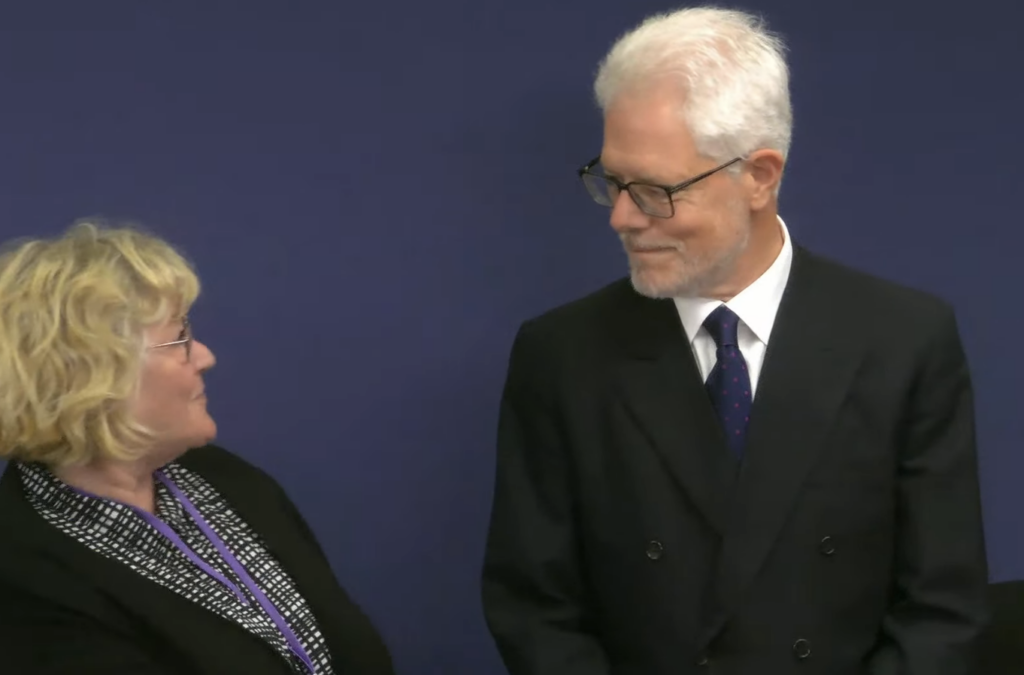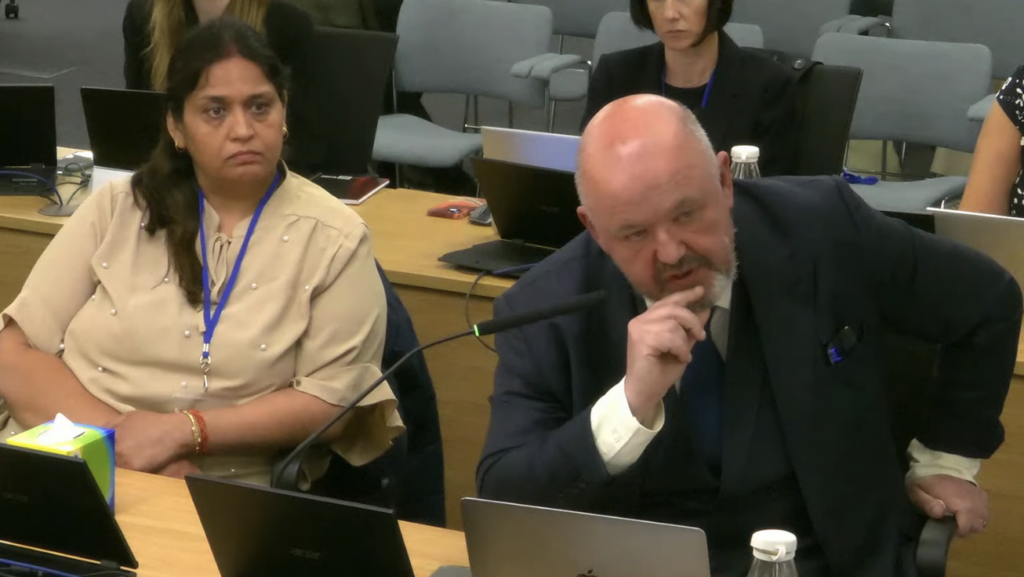
Tom Cooper was pitched into the Post Office madness quite late in the scandal. He joined UK Government Investments in 2017, and became UKGI’s man on the Post Office board in March 2018 whilst it was already embroiled in litigation with with its Subpostmasters and careering towards the first of two disastrous High Court trials.
Cooper is an accountant by trade, starting at KPMG before becoming an investment banker at UBS and Deutsche Bank. The handover with his predecessor Richard Callard (giving evidence on Friday) was not auspicious. Callard apparently reassured Cooper (per Second Sight’s interim report conclusions in 2013) that “no systematic errors [with Horizon] had been found”. Callard apparently informed Cooper there was “no smoking gun in relation to the system”. Cooper said this message “was all reinforced very heavily by the management team in the company, who consistently said the system is fine”.
Cooper did not get sight of the Swift review – something he considered a very important document because it made clear the Post Office “had never assured itself properly, that the [Horizon] system actually worked”.
So far so bad. The Post Office was also, at the time, trying to restrict Cooper and the Post Office board’s access to legal documents. Despite a “protocol” being agreed for sharing privileged material with the board in 2017, it hadn’t actually been put in place by the time Cooper arrived.
Once he was finally given access to legal documents and had sight of the 23 points being argued for the first Common Issues trial (essentially a trial of the contractual relationship between the Post Office and Subpostmasters) in the Bates v Post Office litigation, Cooper realised things were heading towards catastrophe. He singled out the updated liability clause in the Subpostmaster Contract which made the Subpostmaster liable for all losses even if they weren’t the Subpostmasters’s fault.

Cooper told Catriona Hodge, the barrister asking questions for the Inquiry, that the liability clause was “completely unfair… unethical and I think actually undermined the basis of the partnership between Postmasters and the company, because in effect it let the company off the hook doing what it should do in supporting the [Postmaster/Post Office] relationship.”
Cooper said that when he tried to have a conversation with the Post Office he found their legal team was taking a “very entrenched position” to the extent that “if I could not persuade the Post Office on this straightforward point as I saw it, I would not be able to persuade them of the need to compromise on any of the other contractual issues on which the Post Office was vulnerable.”
Cooper thought another point on which the Post Office was vulnerable was its argument that it was not under a contractual obligation to ensure the Horizon IT system worked properly. He told Hodge “a working computer system is fundamental to the whole relationship so it didn’t seem at all unreasonable to me that Post Office should agree to provide that.”
Cooper clearly did not (yet?) live on the flattened earth of Post Office Land.
Dealing with a brick wall
Strangely, despite having a position of considerable influence, Cooper felt unable to demand that the Post Office change direction, telling the Inquiry that by the time he had got a proper handle on the Post Office’s legal position it was the end of October 2018, and the Common Issues trial began the next month. He told Hodge, “this was sort of one minute to midnight in relation to the hearings, so it didn’t seem realistic.”
It wasn’t just timing. The Post Office legal team were in no mood to listen to their government appointed board director. Cooper said approaching them was like “dealing with a brick wall. I might be exaggerating slightly but that was how it felt. They were completely intractable. You couldn’t get any traction with these people on anything.”
Cooper might have got somewhere had he persuaded his fellow Post Office board members that the litigation arguments being run by the legal team made no sense, but he could not win any allies, telling the Inquiry he found it “disappointing… that I didn’t get a lot of support from, or I didn’t feel I got much support from my colleagues.”
Cooper instead decided he might get a better outcome by pushing the Post Office on contingency planning, that is, thinking about what might happen if it lost the litigation. When he had his first meeting with the Post Office’s top internal lawyer – Jane McLeod, the General Counsel – he “asked her ‘if Post Office loses on these points, what’s your response going to be?’ And she said, ‘Oh, we’ll appeal everything.’… That didn’t really make sense to me. It seemed completely inappropriate for a situation that the company found itself in.”
Some of Cooper’s thoughts were fundamental: “could branches stay open?… if Justice Fraser had said Horizon doesn’t work, the current version of Horizon doesn’t work, what happens? Can the company actually continue to operate? Will people be able to get money out?”

Cooper also seemed to have spotted something which he claims no one inside the Post Office mentioned at all – if Subpostmasters couldn’t be held liable for Horizon-generated losses contractually, what did that mean for those Postmasters who had been given criminal convictions on the basis of Horizon evidence?
Rather than approach Jane Kill ‘Em All MacLeod, Cooper on this occasion set out his questions in an email to the UKGI General Counsel, Richard Watson. Cooper wrote:
“I’m wondering about the relationship between contract law (where postmasters take on the liability for missing cash where there is a discrepancy between the Horizon system and the actual cash in the till – this is the agency principle in the contract) and criminal law (where there usually needs to be intent and evidence that cash was actually stolen).
I’m wondering whether the complainants can argue that even though contractually postmasters are responsible for missing cash, prosecutions should not have been made without actual evidence of theft (ie it is insufficient to prosecute simply on the basis that some cash was missing without having proof that it had been stolen). I also wonder to what extent any coercive behaviour by POL (eg in encouraging a guilty plea as an alternative to a fraud trial) could be relevant to this argument as well.”
Asked by Hodge at today’s hearing to spell out what he meant in the email, Cooper said: “in very simple terms if you can’t establish a contractual claim how do you establish a criminal conviction?”
It was, in Cooper’s view, a blindingly obvious potential consequence of the litigation. He told the Inquiry:
“it’s particularly struck me with hindsight that in all of the contingency planning conversations we had with Post Office at this time convictions never came up. In other words… one of the risks they didn’t identify as a risk, that if we lose the litigation, there will be unsafe prosecutions.”
We have lost on all material points
Cooper said he did not get a response to his email. When asked why he didn’t escalate things he told Hodge that he was just asking a question at the time, but if he’d got “got support and encouragement for that from Richard” he might have ensured it got put in a contingency risk register and “raised it at the [Post Office] board which is the place where change could be affected”.

When the Common Issues judgment was first seen by the Post Office on 8 March 2019, it fell to Jane MacLeod to inform the Post Office Board. In an email she told them:
“We have lost on all material points. The judge has criticised Post Office comprehensively – both as to our historic operations and behaviours and our conduct of the case. The judge accepts the evidence of the Lead Claimants but is sceptical of our witnesses who he characterises as ‘extraordinarily partisan’. He has struck out the key contractual provisions which require postmasters to account to Post Office, and he has stated that the Branch Trading Statement – which is the key document on which Post Office relies for postmasters to account for cash and stock in branches – cannot be relied on as a statement of account.”
Cooper responded by asking to see the judgment immediately. He was aghast.
“One of the things that horrified me about the ruling was the argument [put forward by the Post Office] that even if a Subpostmaster had not signed their contract, they were somehow meant to be bound by a contract that was left in a cupboard somewhere in the branch by their predecessor, and I thought this was risible as an argument.”
When he put this to MacLeod and asked “who advised the company to argue this?”, MacLeod apparently responded “well if we hadn’t done that the whole Post Office edifice would have crumbled.”
Cooper told Hodge, “at that point… I completely lost confidence in the legal team.”
Poor Tom. He seems to have had no support from the Post Office lawyers and no support from the Post Office board (in fact, we were told today and yesterday that the Post Office Chairman Tim Parker kept complaining that Cooper was being too interventionist). Why on earth then, did he not raise these matters vociferously within UKGI? Hodge took Cooper to a series of risk reports. These marked the Post Office’s litigation as a deep red risk (those heat maps again), but the language accompanying those heat maps was neutral. Where was the evidence of Cooper making his concerns felt?
Cooper told Hodge: “Effectively I was in the minority of one, in relation to Post Office, I was the only person on the pitch… at least it felt that way, who was questioning the litigation and how it was being handled, and so on.”
According to Cooper, that meant the risk register had to stay anodyne, his reason being “I’m not a lawyer… you can’t colour it too much by the opinions of one person who’s not an expert.”
Cooper also complained that the ministers ultimately in charge of the Post Office didn’t seem to engage with UKGI over the litigation at all:
“I think that we would have benefited by a lot more in-person contact.” Cooper told the Inquiry, “there were times in 2019 when I tried to reach out to the department, particularly the minister [Kelly Tolhurst] to talk to her about it… It was quite hard to gauge to be honest how interested the department was in this. They’d received briefings, quite fulsome briefings actually on the background to the litigation and no questions came back.”
Despite his huge misgivings about appealing the Common Issues judgment and attempting to recuse the judge, Cooper was not party to the discussions or the Post Office board vote which decided to go ahead with both. He sought advice and after receiving it from all quarters, he was told that as a government employee, he should not get involved in something which essentially involved trying to interfere with the judiciary. The real reason, Cooper surmised, was that the Business Department “was telling me that I should not take any action that would increase the chance of this decision coming back to the department.”
Was this, Hodge wondered, because the Business Department “didn’t want to make this difficult decision?”
“Correct”, replied Cooper.
Pot Shots at Misra

There is an extraordinary coda to today’s evidence. After the Horizon Issues judgment dropped in Dec 2019 and the Postmasters settled the case in their favour, Cooper asked a junior colleague at UKGI to compile (as he put it in a later email) “a list of the [Subpostmaster] cases that have been covered publicly. I’d [like] to have a dossier of these cases which includes the claimants’ side of the story as a check against what the Post Office will show us.”
Cooper says he did this because the last time he had tried to get proper information about individual Subpostmasters from the Post Office, he had been “fobbed off”, so he turned to the public domain because he couldn’t “trust the Post Office to give me a proper description of what the claimants are saying.”
Ed Henry KC, barrister for Seema Misra, suggested Cooper’s real reason for his research exercise was “to see if you could undermine” the campaigning Subpostmasters. Cooper denied it, saying it was “the opposite of what I was trying to do.”
Henry took Cooper to a note of a meeting in January 2020 between Brian Altman QC, Rodric Williams from the Post Office legal team and Nick Vamos from Peters and Peters, the law firm engaged by the Post Office to deal with the Post Office’s review of its criminal prosecutions. The discussion was clearly around whether or not to resist any criminal appeals arising from the findings in Bates v Post Office.
In the note, someone is minuted as saying: “Board’s concern is that there is a narrative and we’re just letting it go. Board desperate to decide whether to take pot shots at Misra.”
Later someone states: “Tom Cooper/Tim Parker – need to say “Misra has been saying x in the press, what our actual review of her case is x”. Don’t know and are looking to us to tell them.”
The assumption between Ed Henry and Tom Cooper was that the person saying this at the meeting was Rodric Williams. Henry asked Cooper why he or Tim Parker might be looking to undermine Seema Misra.
“I have no idea where this came from”, replied Cooper. “My attempts to look at the press coverage of Mrs Misra’s case and others, was to actually challenge Post Office’s description of events. I was not in a position at this point in time to decide if I was ever going to take pot shots at anyone, whatever that means.”
“Are you saying that Williams just invented that?” asked Henry.
“As far as I’m concerned, yes” replied Cooper.
There followed some to-ing and fro-ing about Cooper’s recollection of the intentions of the Post Office board, and the intentions ascribed to the board in the meeting minute. Eventually Henry said:
“You appear to be suggesting that you are saying stop, but Williams is saying go, in other words… the instructions that the board are giving are – as it were – totally reversed.”
“Correct. Does that surprise you?” asked Cooper.
“I suggest that’s not credible.” replied Henry, slowly.
“Well, I’m sorry in that case,” said Cooper, “but I am I’m being entirely truthful.”
Someone was lying.
Watch Cooper’s evidence in its entirety, read the transcript and his witness statement here.
Jane MacLeod is in Australia and has refused to give oral evidence to the Inquiry.
Rodric Williams has already given oral evidence to the Inquiry
For a real-time gallop through Cooper’s evidence and the documents he was shown today here are the live tweets.
The journalism on this blog is crowdfunded. If you would like to join the “secret email” newsletter, please consider making a one-off donation. The money is used to keep the contents of this website free. You will receive irregular, but informative email updates about the Post Office Horizon IT scandal.

Leave a Reply